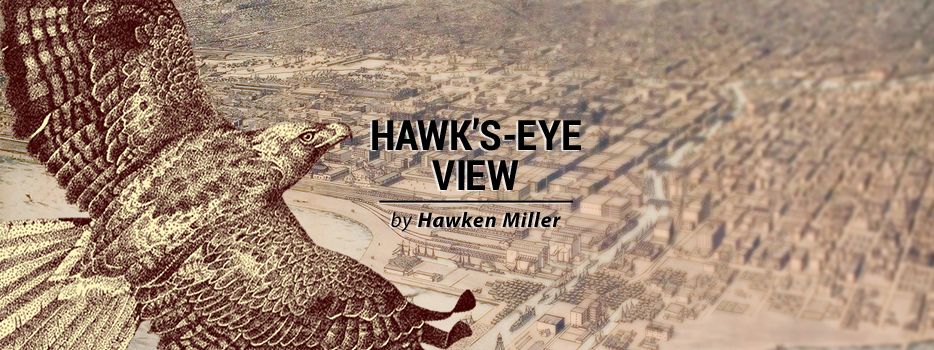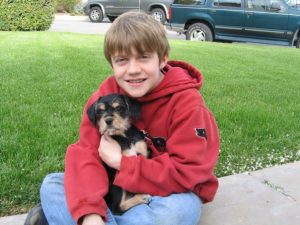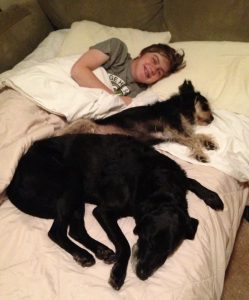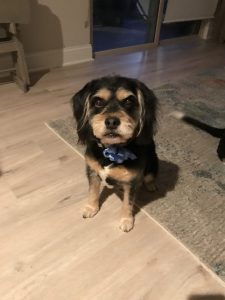What I Learned About Life From My Dog
Written by |

On Sept. 29, part of my life was lost. My dog, Gus, who had been a staple of the Miller family household for 13 years, left the world. To where, we can only guess, but he left parts of his odd personality with us and gave us memories we will never forget.
I doubt Gus knew I had Duchenne, but like our furry friends we know and love, he didn’t care. He was always game for a quick scratch behind the ears or a belly rub. When I came home from school, I knew where to find him: head resting on his stuffed toy hedgehog, which he protected with his life. His growl increased in volume and veracity the closer you got to touching his prized possession. Gus gave a sense of normalcy and routine to life with a disease that was anything but.
It took a few return trips to the pet store for us to fall in love. He wasn’t your average-looking pup. Behind the multicolored whiskers on his snout, making him look older and wiser with youth like Benjamin Button, one could clearly see his resemblance to the Ewoks who live on Endor. We sat in the playpen, and Gus willed his way into following us home, sitting resolutely on my lap.
While my dad and I were stretching after taking him home, we noticed the light-colored fur on his stomach looked like the shape of a hawk. I don’t need to spell out the coincidence for you there (i.e., the title of my column). Gus wasn’t always front and center, with us having two other dogs during his lifetime, but he was consistent. We didn’t have to worry about him running away, and he loved everyone. In turn, everyone loved him.
He was a presence we took for granted until it was lost. The apartment is eerily quiet without the incessant pitter-patter of his nails on the wood floors. The warm creature on the couch is no more. His high-pitched bark when he climbed up on the table and couldn’t find a way back down is gone. Giving him his insulin injection during the last years of his life was a mundane moment we all miss.
You would think humans train dogs, but I’ve come to realize it’s the other way around. I didn’t think I’d learn much from Gus, but I was very wrong. On our canoe trip down the Colorado River, we were all surprised to witness him fearlessly charge into the water in a valiant attempt to show some ducks who was boss. Lesson: Don’t let your size or society’s perceptions of you get in the way of trying your hardest, even if you don’t succeed.
Gus showed me the value of just showing up. He was always happy to see me, even if he was taking away from my video game concentration by barking about a toy stuck under a cabinet. I always knew I could rely on him to make me laugh or be with me when I didn’t want to be alone. If I came anywhere close to that in my relationships with the people I love, I would be more than content.
He taught me about the impermanence of our life on Earth. I was with him the day we got him at 9 years old, and I was there the moment he left us at 23 years old, scratching him in his favorite spot behind his ears until the end. It’s given me a new perspective that someday, I’ll be gone, too. What will I have left the people I love? Gus is still teaching me even though he’s not here anymore: Let’s make the most of the time we have and give light to the people around us.
Gus also looked like the wise, old Jedi Master Yoda, and even with the things about him that drove us crazy, he might have actually fit the part, too. That’s at least what his Yoda collar, sitting on its forever perch in the foyer, will always remind us.
***
Note: Muscular Dystrophy News is strictly a news and information website about the disease. It does not provide medical advice, diagnosis or treatment. This content is not intended to be a substitute for professional medical advice, diagnosis, or treatment. Always seek the advice of your physician or another qualified health provider with any questions you may have regarding a medical condition. Never disregard professional medical advice or delay in seeking it because of something you have read on this website. The opinions expressed in this column are not those of Muscular Dystrophy News or its parent company, Bionews, and are intended to spark discussion about issues pertaining to muscular dystrophy.







